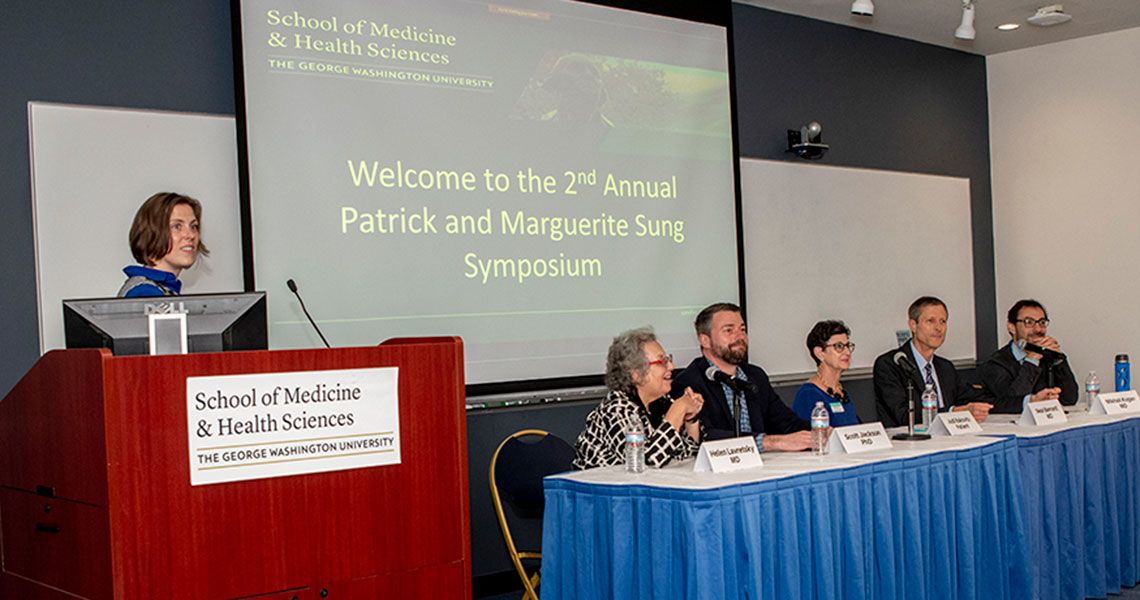Attendees at the 2nd Annual Patrick and Marguerite Sung Symposium filled Ross Hall, Room 117, eager to hear insightful discussions about brain health, wellness, and the power of integrative medicine on Friday, April 16.
The event, sponsored by the George Washington University (GW) School of Medicine and Health Sciences (SMHS) Office of Integrative Medicine and Health (OIMH), included two featured speakers and a panel discussion and question-and-answer session.
Featured speakers included Emeran Mayer, MD, PhD, a pioneering medical researcher into brain-gut interactions and professor of medicine, physiology, and psychiatry in the David Geffen School of Medicine at the University of California, Los Angeles (UCLA); and Helen Lavretsky, MD, director of the Late Life Mood, Stress, and Wellness Research Program at UCLA’s Semel Institute for Neuroscience & Human Behavior and a professor in the Department of Psychiatry at UCLA.
Reamer L. Buschardt, PharmD, PA-C, senior associate dean for health sciences at SMHS, kicked off the event with remarks on the success of OIMH since its beginning in 2017. “I have great hope in the years to come it will continue to grow,” he said.
He added that the symposium, all the effort that preceded the event, and the work that will follow it, “symbolizes the need to drive innovation and improve the quality and the person-centeredness of the care we provide patients and families in our community.”
John Pan, MD ’70, RESD ’74, founding medical director of OIMH and clinical professor of clinical research and leadership at SMHS, also spoke at the event, welcoming attendees and introducing the discussion topics.
Mayer’s lecture focused on “Healthy Brain, Health Plant,” a tour from the brain to the gut, and down to the soil.
“Communication between the gut microbiome and the brain is a ubiquitous, ancient, evolutionary conserved system that modulates host behavior,” he explained.
Key components of plant-based diets, he added, act through the gut microbiome to produce gut and brain health, and that the soil’s microbiome has a major influence on the health of plants, the gut microbiome, and even the brain.
“If you get deeper into this, you realize that many of our problems of health go way back to the beginning with the soil and the way we grow food in this current industrial environment,” he said.
Mayer gave a holistic view of the possible connection between the microbes in a person’s gut and their brain function.
Lavretsky followed Mayer’s enthusiastically received lecture with a talk about the use of many different forms of mind-body therapies for treatment and prevention of late-life mood and cognitive disorders.
She said that use of practices such as yoga and tai chi are growing rapidly, especially among younger adults.
“There’s a cultural shift, which I think is related to the generational shift of younger adults being more open to alternative techniques and integrative techniques that older adults might not be accepting of,” she said. But, she added, baby boomers also are becoming more open to new complimentary forms of medicine.
“Research is used to identify common and specific features that mind-body medicine produces by studying its effects on brain mechanisms, physiology, and psychology, as well as clinical outcomes of various diseases,” Lavretsky said.
She also spoke about the importance of resilience in overcoming trauma, and how resilience can be enhanced through integrative medicine and the use of mind-body interventions to result in effective coping of stress and turning adversity into opportunity for growth.
Attendees also had the chance to pepper a panel of experts with questions. Panelists included Lavretsky; Scott Jackson, PhD, group leader of complex microbial systems at the National Institute of Standards and Technology and adjunct assistant professor of clinical research and leadership at SMHS; patient and yoga teacher Judi Eskovitz; Neal Barnard, MD ’80, RESD ’84, president of the Physicians Committee for Responsible Medicine and adjunct associate professor of medicine at SMHS, and Mikhail Kogan, MD, director of the GW Center for Integrative Medicine and assistant professor of medicine at SMHS. Leigh Frame, PhD, MHS, director of the integrative medicine program at SMHS, moderated the panel.
The audience asked questions on various mind-health and microbiome topics, including about supporting mindfulness during the transition from the hospital to home, reimbursements for yoga therapy, the use of antioxidants and probiotics, and nutrition as part of education in and outside the classroom.
Among them was Saurab Faruque, a graduate student in the Milken Institute School of Public Health at GW.
“The second lecture had a huge impact on me, especially since I’m interested in cognitive aging, and it showed me how current research is bridging the gap between Eastern and Western practices,” said Saurab, who is pursuing a master of public health degree in community oriented primary care. “Dr. Lavretsky’s studies suggest that mindfulness practices, specifically tai chi, are significantly more effective cognitive resiliency builders in older adults than traditional methods.”
After the panel session, attendees gathered for a reception, where they had the chance to talk with the panelists and each another at length about the lectures and the burgeoning field of integrative medicine.
OIMH was established thanks to a donation of $500,000 by GW alumnus Patrick Sung, PhD, JD ’77. The office supports GW medical and academic faculty in integrative medicine practice and research, and also engages with the larger community of complementary and alternative medicine practitioners. Sung, who was diagnosed with myasthenia gravis, worked with Pan to explore therapies other than the traditional offering, and he credits the integrative medicine approaches he adopted with his remission.



